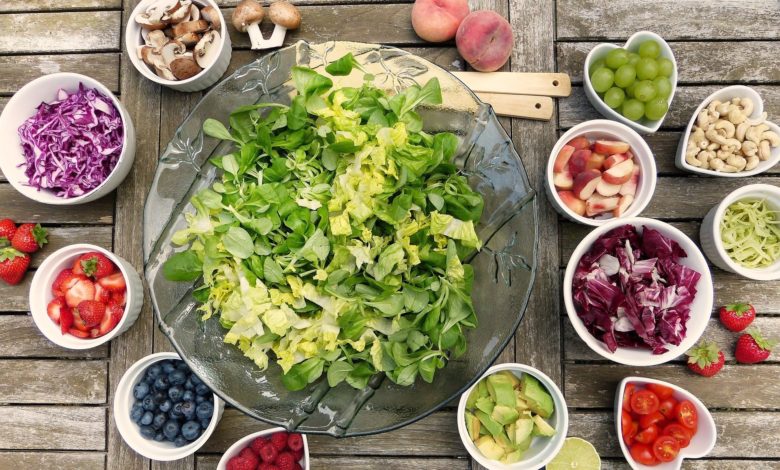Top 10 Probiotic Foods for Vegans

The term vegan was coined in 1944 by a small group of vegetarians who left the Leicester Vegetarian Society in England to form the Vegan Society. This term was chosen by combining the first 3 and last 2 letters of the word vegetarian. Vegans are individuals who avoid animal products for ethical, health, or environmental (or a combination of all three) reasons. In addition to avoiding meat like vegetarians, they chose not to consume dairy, eggs or other products of animal origin. Veganism or veganism is now defined as a way of life that works to exclude animal exploitation and cruelty from all forms, be it food, clothing, or any other purpose, and it is becoming increasingly popular. In addition to animal products, vegans also avoid any animal-derived ingredients such as albumin, casein, carmine, gelatin, pepsin, shellac or shellac, isinglass (a clarifier of wine and beer, the active ingredient of which is derived from fish swimming pouches) and whey. . Those who choose veganism are fed a variety of plant foods, including fruits, vegetables, whole grains, legumes, nuts, seeds and products made from these foods, instead of animal foods (meat, chicken, fish, shellfish, eggs, milk and dairy products, honey).
What is Probiotic?
Probiotics are microorganisms found naturally in the digestive tract that aid digestion and reduce inflammation. While there are several different classes and strains of probiotics, some of the most common are Bifidobacterium, Lactobacillus, and Saccharomyces boulardii, a type of yeast. Food manufacturers may call probiotics “live cultures” or “active cultures.” Many fermented products contain probiotics, which means the bacteria contained in them are still alive.
Potential Benefits of Probiotics
Research is ongoing on the health benefits of probiotics. Researchers have discovered that different strains of bacteria have a range of effects on the body. It may be best to eat a variety of probiotic-rich foods to allow different strains to enter the body. Some of the potential benefits of probiotics include:
Improving digestion: Probiotics help break down food and speed digestion. It can also reduce symptoms of constipation, Crohn’s disease, and irritable bowel syndrome.
Reducing cancer risk: Some studies show that disruption of the gut microbiota may play a role in a variety of diseases, such as inflammatory bowel disease and cancer associated with colitis. As a result, researchers suggest that probiotics can help prevent these diseases.
Vaginal health: The vagina contains a lot of bacteria. Antibiotics, spermicides and birth control pills can disrupt the delicate balance in the vaginal canal, causing infection. Probiotics can restore balance and help prevent these problems.
Mental health: Experts believe that good gut health can affect mental health. Research suggests that probiotics can reduce feelings of depression and anxiety, but additional studies are needed to confirm this.
Reducing the side effects of antibiotics: More than a third of people taking antibiotics will develop antibiotic-associated diarrhea. For this reason, some doctors recommend taking probiotics along with antibiotics to prevent this side effect.
Reducing the risk of metabolic diseases: Obesity, type 2 diabetes and non-alcoholic fatty liver disease are types of metabolic diseases. Regular consumption of probiotics can prevent and treat these ailments.
Diabetes management: Some research reports that probiotics can improve glycemic control and lipid metabolism in patients with type 2 diabetes.
What Are The Best Vegan Probiotics?
The best probiotic foods vegans can eat are:
1-German style sauerkraut
German style sauerkraut (sauerkraut or sour cabbage) is a fermented cabbage dish popular in many Eastern European countries. It is rich in potassium, vitamins C and K as well as probiotics. Sauerkraut is made by allowing the finely cut cabbage to ferment in brine, a highly concentrated solution of brine (sea salt is used). Lactobacillus bacteria in cabbage convert sugars found naturally in the tissue of cabbage into lactic acid. Sugar and vinegar are not used during the preparation of the marinade, but black pepper, cumin seeds and a few bay leaves can be added to add flavor. The result is a crunchy and sour flavor that can be eaten in sandwiches, salads or on its own. Many health food stores and supermarkets sell sauerkraut. It is best to choose an unpasteurized product, as pasteurization destroys most of the beneficial bacteria.
2-Kimchi
Kimchi is a spicy fermented cabbage dish that is popular in Korean cuisine. Contains probiotics, vitamins and antioxidants. The process of making kimchi is similar to sauerkraut, but it also includes spices and some other vegetables. Those who wish can make kimchi at home or find them in health food stores. Vegans eating out at a restaurant should check if their kimchi contains seafood.
3-Vegetable pickles
Pickled vegetable pickles make a tasty, probiotic-rich snack or side dish suitable for vegans. It’s possible to ferment and pickle almost any vegetable, but some of the most popular options include:
- Cucumber
- Carrot
- Radish
- Green beans
- Cauliflower
- Red bell pepper
Herbs and spices can be added for extra flavor, such as:
- Garlic
- Bay leaves
- Black pepper
- Coriander seeds
While fermented vegetables are rich in many nutrients, they also contain plenty of sodium. In order to avoid the risks of a high salt diet due to reasons such as high blood pressure and edema, pickled foods should be consumed in moderation.
4-Kombucha
Kombucha is a fermented tea with an estimated 2000-year history in Japan and revived in the west in recent years. Green or black tea is used in making kombucha. For the preparation of kombucha, a starter (or kombucha mother) called a SCOBY, which is a symbiotic culture of bacteria and yeast, and some sugar are needed. This starter gelatinous mass does not look very appetizing but is packed with beneficial microorganisms. The SCOBY launcher is available online or at health food stores. The fermenting process in a glass jar can take a week or 15 days (maybe a little longer). Alternatively, ready-brewed kombucha can be purchased at some coffee shops and supermarkets. Kombucha contains low levels of alcohol (less than 1%). Some versions contain enough alcohol to classify them as beer, so it may not be suitable for some individuals, including those who are pregnant or breastfeeding.
5- Water Kefir
Water kefir is a probiotic drink. As with the Kombucha, it requires a starter culture containing bacteria and yeast. These are available online, at health food stores, or from fermented food enthusiasts. Water kefir grains with starter culture help ferment sugar water, juice or coconut water to create a lightly flavored and healthy drink. With proper care, the culture grains grow regularly and remain viable for years. Vegans should avoid kefir made from milk and this kefir starter.
6- Tempeh
Tempeh, a flavor unique to Southeast Asian countries, especially Indonesia, used since 1800 years ago, is new to western countries. Tempeh is a soy-based food produced by the fermentation of soybeans, similar to tofu but tastier than it. As a result of fermentation, a food rich in tempeh, probiotics and protein is obtained to replace meat. Its solid texture makes it suitable for use in a variety of dishes. Vegans can use tempeh in salads, fries, burgers, sandwiches and more.
7- Sourdough Bread
Traditional sourdough bread requires a sourdough starter that consists of a combination of flour and water that has been fermented (fermented) for several days. The starter yeast should be fed regularly with flour in order to make freshly leavened bread and allow them to be used over and over again. Not all sourdough breads contain probiotics, so it’s important to check the ingredients first. Many stores and companies do not use a fermented starter culture to make sourdough.
8- Miso
Miso is a fermented (fermented) Japanese food. It is used in miso soup, a traditional Japanese dish, and in the preparation of other dishes in the kitchen. It is a great option for vegans looking for probiotics rich in antioxidants, B vitamins, and beneficial bacteria. Rice or barley is fermented with soybeans, a little grape juice, a mushroom called koji, and sea salt to form a kind of paste or paste. Miso dough is used for salad dressing, frying sauces and marinades, as well as miso soup, which is famous in Japan. When making miso soup, it is important to use lukewarm water rather than hot water so that the soup is not boiled, because high temperatures kill probiotic bacteria.
9- Fortified Milk Alternatives
Plant-based fermented milks, such as soy milk, almond milk, rice milk, coconut milk, alternative to animal milk (cow or sheep milk) contain live cultures. Manufacturers add these beneficial bacteria to milk alternatives to increase their benefits. Labels on these products should be checked for Lactobacillus and other probiotic species.
10- Supplements
While probiotic-rich foods are a good option for vegans, not everyone has the time to make these foods, and some people may not like their taste. In these cases, supplements offer an easy alternative, but not all probiotic supplements are suitable for vegans, so always check labels carefully. The United States Food and Drug Administration (FDA) does not regulate probiotic supplements, so there is no guarantee that these products contain the types of bacteria that manufacturers claim. Products should be researched before purchase and ensure they come from a reputable source. It is possible to buy probiotic supplements from health stores, some pharmacies, and online websites.
Can probiotics have side effects?
Researchers are constantly doing new studies on the benefits of probiotics, testing everything from their effects on the common cold to their ability to reduce symptoms of inflammatory bowel disease. Although researchers do not know what dosages or types of food may produce the best results, including probiotic foods in the diet can help improve digestion. Food labels should always be read carefully to ensure that food contains live and active cultures.
Although the benefits of probiotics are many, some side effects can be seen. Some people may experience side effects such as gas or nausea when eating probiotic foods. By adding one or two different probiotic foods to the diet every week, the body can be accustomed and the side effects can be reduced. Anyone with a weakened immune system, pregnant or following a special diet due to a pre-existing medical condition should ask their doctor before eating probiotic foods. Probiotic-rich foods are a delicious way to add more beneficial bacteria to the diet. Even without consuming milk, vegans can enjoy a range of fermented foods and drinks that improve gut health and overall well-being. A nutritionist can recommend safe ways to include probiotics in a person’s diet.





